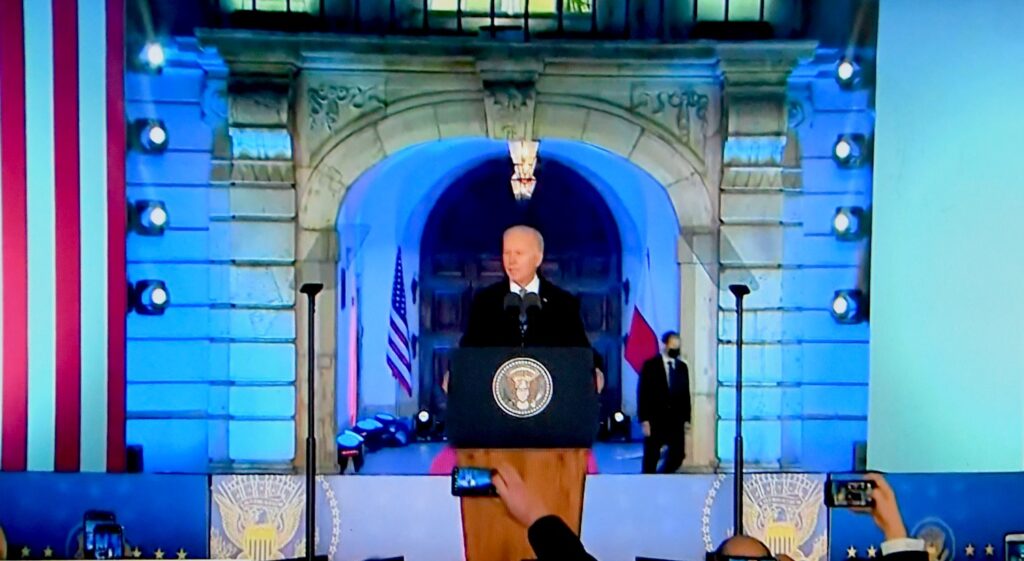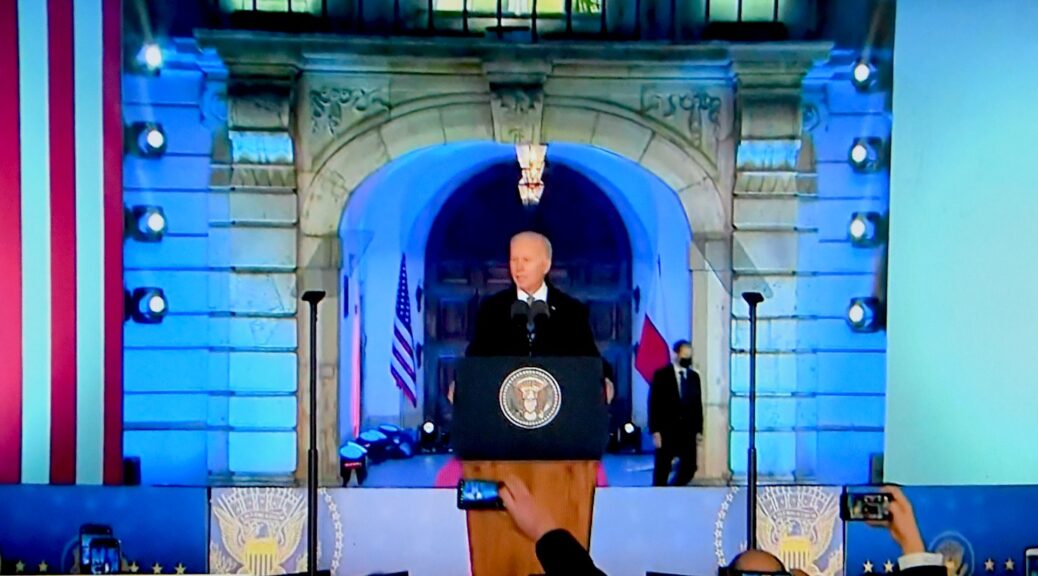Letter from the President on the Implementation of the Global Fragility Act

The world stands today at the dawn of a decisive decade — a moment of consequence and peril, of profound pain and extraordinary possibility. Perhaps now more than ever, we have seen how the most urgent challenges of our time do not confine themselves within national borders. A global pandemic that has claimed more than six million lives. A climate crisis that threatens the future of every continent. An emboldening of autocrats who believe that democracy and multilateralism cannot deliver in the 21st century. These tests, and more, are among the sternest that the world has ever faced.
It is against this backdrop — at this inflection point in history — that America must lead. We know all too well that today’s most pressing challenges — their root causes as well as their impacts — are global in nature. We know that America’s security and success hinge in no small measure on the peace and stability of the world beyond our borders. We know that beneath the global crises we face lie breathtaking opportunities for our Nation and the world — if we can summon the will to seize them.
This document — a prologue to the U.S. Strategy to Prevent Conflict and Promote Stability — represents an assertion of American leadership to take on the defining global challenges of our time. Driven in large part by the tireless commitment of humanitarian advocates and civil society organizations working on the front lines of conflict, this Strategy is the product of a bipartisan vision, manifested by the passage of the Global Fragility Act in December 2019 with overwhelming bipartisan majorities. It provides a roadmap: a 10-year effort to strengthen the security and prosperity of people everywhere by helping to fortify the footing of parts of the world that continue to grapple with challenges that can lead to destabilizing conflict and violence. It is, in short, an investment in global peace and security — one which will deliver critical returns not only in the nations with whom we’ll be working, but, most of all, here in the United States.
The heartbreaking images we are seeing in Ukraine — the result of a vicious and unprovoked attack by Vladimir Putin — are only the latest reminder of the tragic consequences of global conflict and the need to avert violence before it erupts. We know that working broadly, strategically, and cooperatively to prevent conflict and instability is the greatest investment we can make in America’s future, and in the future of the entire world. In Ukraine, as in Ethiopia, Syria, Yemen, and elsewhere around the world, the incalculable toll of lives lost, families separated, economies destroyed, and social fabrics torn threatens to spiral whole regions into cycles of violence and loss that can linger for generations. Doing all that we can to assist communities around the world in their conflict prevention efforts is more than just the right thing to do. It saves lives, safeguards Americans’ own security and prosperity, and establishes the United States as a trusted partner — a force for peace and stability in the world, and a nation that can be counted on to work and learn productively alongside the nations of every region to tackle common challenges and strengthen our shared future.
This Strategy lays out a whole-of-government approach to advancing America’s national interests on the world stage. This means tapping into the expansive expertise and resources that reside across our Government, sharpening and updating those tools where needed, humbly applying the costly and painful lessons from the past, and transforming the way we work with each other. Our diplomats, officers, and experts in the State Department, the United States Agency for International Development, the Department of Defense, the Department of the Treasury, and others across Government, as well as members of the Foreign Service and Armed Forces, will work in close cooperation with multilateral organizations and a wide variety of local partners in each nation where these efforts will be pursued — including civil society organizations, community leaders, businesses, and government officials.
Those who are closest and most vulnerable to these challenges know best where the opportunities for peace and stability lie — they represent the strongest source of promise and immunity from destabilizing forces, and we must support their strength and resilience. From strengthening social institutions and state-society relations, to mitigating the spread of extremist ideologies, to confronting the corrosive impact of gender inequality, to cultivating greater trust between security forces and citizens, to guarding against the destabilizing threat of climate change — we will help foster locally led, locally owned solutions grounded in mutual trust and long-term accountability.
Prevention is hard work — measured not in days and weeks, but in years and generations. Its successes are never as evident as its failures, and it requires us to remain focused on lasting peace and stability over the allure of easier, more temporary gains that may not strengthen our position in the long term. But, with this Strategy, we are committing ourselves to the effort. As we implement this Strategy, my Administration looks forward to working closely with the Congress on a bipartisan basis, and in close consultation with civil society institutions and stakeholders on every level. United in our vision, America can and must lead this essential new effort to interrupt potential pathways to conflict, alleviate threats before they escalate and arrive on our shores, and help safeguard the economy, health, and security of our Nation for generations to come. –Joseph R. Biden, Jr.
Addressing the Collective Challenges of our Time:
Implementing the U.S. Strategy to Prevent Conflict and Promote Stability
Every country, including our own, experiences risks and challenges related to stability and conflict. The international community grapples with issues that cut across borders, societies, ways of life, and economies. As the world has witnessed too often, the effects of conflict and instability are not constrained by borders or technologies. Cooperation and long-term investments in conflict prevention and stabilization are needed now more than ever to build peace across divided communities and boundaries. We must collectively bolster societal resilience to prevent and reduce the heavy human and financial costs of conflicts that undermine global peace, security and sustainable development.
On March 24, 2022, the Biden-Harris Administration launched the implementation of the U.S. Strategy to Prevent Conflict and Promote Stability with partner countries across the globe. The Strategy outlines a ten-year, evidence-based, whole-of-government effort to foster peace and long-term stability through integrated U.S. diplomacy, development, and security-sector engagement with dual goals of strengthening national and regional peace, resilience and stability and enhancing the way our government operates in a variety of contexts.
Through collective action and partnership, the United States seeks to advance the vision and goals of the landmark Global Fragility Act through this Strategy in four diverse countries and one sub-region facing a wide variety of challenges to peace and stability. This Strategy advances U.S. national security and interests. The work now underway represents an important milestone, and next step, in the implementation of the Global Fragility Act, which continues to enjoy strong support within the U.S. Congress and among civil society. Through a spirit of partnership, we can and will build on strengths of communities, governments, and nations to rebound from shocks, confront negative global trends and create new paradigms for broader cooperation. The Strategy and Prologue chart a new path toward positive results that strengthen democracy, rule of law, security, good governance, gender equity and equality, health, education, and respect for human rights all aligned to fuel reservoirs of peace, strength and recovery and extinguish potential discord before it is sparked.
The United States will partner with Haiti, Libya, Mozambique, Papua New Guinea, and Coastal West Africa (Benin, Côte d’Ivoire, Ghana, Guinea, and Togo) guided by these principles:
- Work collaboratively with government and civic partners on an integrated approach to prevent conflict, promote resilience and stability, and advance economic development;
- Look beyond urgent crises and near-term needs to focus on mutually determined strategic goals and interests through whole-of-government ten-year plans;
- Utilize development, diplomacy, and security-sector means in a coordinated way to support the pursuit of goals, foster an enabling environment, and solidify progress;
- Provide new tools and insights to strengthen democratic institutions, for example in the areas of rule of law, anti-corruption, law enforcement, and fiscal transparency, and to promote human rights and gender equity and equality;
- Adapt to and learning from changing conditions, anchor efforts in local communities, and make strategic adjustments based on joint analyses, research, and monitoring and evaluation; and
- Take a multifaceted approach to address other current and emerging challenges, such as the climate crisis, global pandemics and declining democratic practices.
The U.S. Congress authorized up to $200 million a year for these efforts and appropriated $125 million in Fiscal Year 2022 for the Prevention and Stabilization Fund, which supplements existing bilateral U.S. assistance to these partner countries. This funding will support the development of ten-year implementation plans and related regional and multilateral activities.
The Biden-Harris Administration will closely monitor progress, milestones, and accomplishments under the Strategy. These efforts will endure across future U.S. Administrations and advance much needed innovative approaches to peace and stability.
Read the Biden letter on the Global Fragility Act Implementation.

